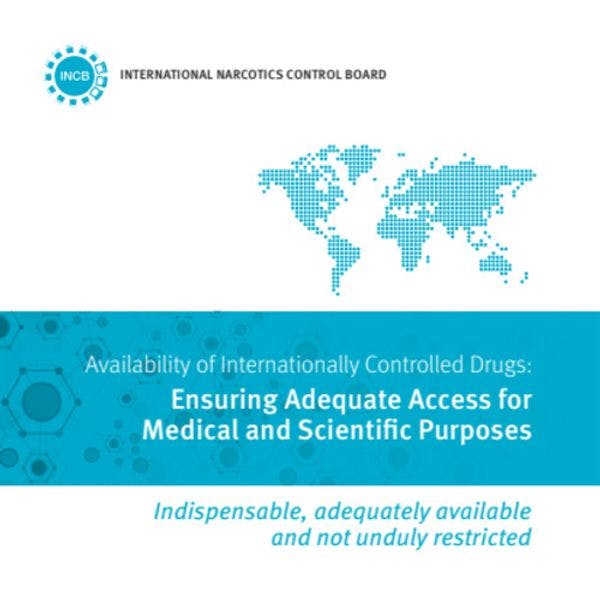Availability of internationally controlled drugs: Ensuring adequate access for medical and scientific purposes
Several decades ago, the international community made a solemn commitment with the Single Convention on Narcotic Drugs of 1961 as amended by the 1972 Protocol and the Convention on Psychotropic Substances of 1971:2 to make adequate provision to ensure, and not to unduly restrict, the availability of drugs that were considered indispensable for medical and scientific purposes. In recent decades, that promise has not been completely fulfilled. Too many people still suffer or die in pain or do not have access to the medications they need. Unnecessary suffering resulting from a lack of appropriate medication due to inaction and excessive administrative requirements is a situation that shames us all.
Around 5.5 billion people still have limited or no access to medicines containing narcotic drugs, such as codeine or morphine, leaving 75 per cent of the world population without access to proper pain relief treatment. Around 92 per cent of morphine used worldwide is consumed in countries in which only 17 per cent of the world population lives: primarily the United States of America, Canada, Western Europe, Australia and New Zealand. Inadequate access contradicts the notion of article 25 of the Universal Declaration of Human Rights, including the right to medical care, which also encompasses palliative care.
The imbalance in the availability of opioid analgesics is particularly worrying, as the latest data show that many of the conditions that require pain management, particularly cancer, are prevalent and increasing in low- and middle-income countries. At the same time, in recent years there has been an increase in the abuse of prescription drugs and related overdose deaths in countries with high per capita levels of consumption of opioid analgesics.
Apart from the needs related to cancer, pain treatment is required for many other health conditions. In several regions of the world, pain relief drugs are not commonly prescribed. Other internationally controlled drugs such as methadone and buprenorphine are used in the management of drug dependence, but their use is also limited in some countries despite a considerable prevalence of heroin abuse.
The Board is presenting this special report to Member States in the hope that the analysis and recommendations presented therein may assist them in the development of national policies and control systems that are capable of achieving the goals of the international drug control conventions in relation to ensuring availability of narcotic drugs and psychotropic substances. Member States have already underlined the importance of this issue in a number of resolutions and political declarations adopted by the Commission on Narcotic Drugs. They also referred to it in the Political Declaration of the High-Level Meeting of the General Assembly on the Prevention and Control of Non-communicable Diseases and in resolution WHA67.19 of the World Health Assembly, on strengthening of palliative care as a component of comprehensive care throughout the life course.
Furthermore, the present report is being offered to the international community ahead of the special session of the General Assembly on the world drug problem to be held in 2016, and the Board hopes that this contribution will help Member States in their deliberations. At a time when countries are discussing the achievements of the international drug control system, the Board would like to offer a reminder that the overall goal of the international drug control conventions is a wellfunctioning national and international system for managing the availability of narcotic drugs and psychotropic substances by ensuring the safe and rational delivery of the best affordable drugs to
those patients who need them and, at the same time, preventing the diversion of such drugs for the purpose of abuse.
Keep up-to-date with drug policy developments by subscribing to the IDPC Monthly Alert.
